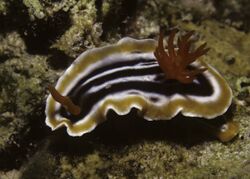Biology:Chromodoris magnifica
| Chromodoris magnifica | |
|---|---|

| |
| The nudibranch Chromodoris magnifica, Mactan Island, Cebu, Philippines. | |
| Scientific classification | |
| Domain: | Eukaryota |
| Kingdom: | Animalia |
| Phylum: | Mollusca |
| Class: | Gastropoda |
| Subclass: | Heterobranchia |
| Order: | Nudibranchia |
| Suborder: | Doridina |
| Superfamily: | Doridoidea |
| Family: | Chromodorididae |
| Genus: | Chromodoris |
| Species: | C. magnifica
|
| Binomial name | |
| Chromodoris magnifica (Quoy & Gaimard, 1832)[1]
| |
Chromodoris magnifica, also known as the magnificent sea slug is a sea slug, a species of nudibranch, a shell-less marine gastropod mollusc in the family Chromodorididae. It is the type species of the genus Chromodoris.[2]
Distribution
This nudibranch is found in the central area of the Indo-Pacific region from Indonesia and the Philippines to New Guinea and Eastern Australia .[3]
Description
Chromodoris magnifica can reach a maximum size of 60 mm (2.4 in) in length.[4] The body is elongate with a foot which is distinct from the upper body by a skirt like mantle hiding partially the foot.[5] The branched gills and the rhinophores are orange colour and can be withdrawn into specific pockets under the skin in case of danger.[6] The specific epithet magnifica in Chromodoris magnifica means magnificent, so-named because of this nudibranch's striking, vibrant colors.[7]
The background colour of the body is bluish white which varies in intensity from one specimen to another. On the mantle, the bluish area is outlined by two continuous black lines and a median continuous line crosses it also. These bluish parts are often marked with dash-like black lines. The margin of the mantle is bordered with a large white band with a central orange colour line, the width of these lines is variable for each specimen.[8] The foot has three black continuous longitudinal lines. Its background colour is the same as its mantle. The margin of the foot is outlined by an orange and a white line.
This species is easily confused with the similar looking Chromodoris quadricolor. Chromodoris magnifica can be distinguished by its submarginal orange border.[3]
Ecology
Chromodoris magnifica feeds on sponges and has been observed feeding on red and grey sponges.[9]
Chromodoris magnifica juvenile in Puerto Galera, Philippines .
References
- ↑ (in French) Quoy, J. R. & Gaimard, J. P. (1832). Voyage de decouvertes de L'Astrolabe pendant les annees 1826-1827-1828-1829, sous le commandement de M.J. Dumont D'Urville, Zoologie, 2: 1-686.
- ↑ Caballer, M. (2015). Chromodoris magnifica (Quoy & Gaimard, 1832). In: MolluscaBase (2015). Accessed through: World Register of Marine Species on 2015-12-06
- ↑ 3.0 3.1 Rudman, W.B., (8 April 1998) Chromodoris magnifica (Quoy & Gaimard, 1832). [In] Sea Slug Forum. Australian Museum, Sydney.
- ↑ Olivier Aillery (2015) Chromodoris magnifica Fiche espèce n°1305, Sous les Mers.
- ↑ Debelius, Helmut (2001) Nudibranchs and Sea Snails: Indo-Pacific Field Guide, IKAN - Unterwasserarchiv, Frankfurt, Germany.
- ↑ David Behrens (2005) Nudibranch behaviour, Newworld Publication INC., ISBN:978-1878348418
- ↑ P.L. Beesley, G.J.B. Ross, A. Wells (1998) Mollusca - The southern synthesis. vol. 5, CSIRO, ISBN:0-643-05756-0
- ↑ Gary Cobb & Richard Willan (2006) Undersea jewels - a colour guide to nudibranchs, Australian Biological Resources Study, ISBN:0642568472
- ↑ Rudman W.B. & Bergquist, P.R., 2007. "A review of feeding specificity in the sponge-feeding Chromodorididae (Nudibranchia: Mollusca). Molluscan Research 27(2): 60–88.
External links
- Photos of Chromodoris magnifica on Sealife Collection
Wikidata ☰ Q2262681 entry
 |



